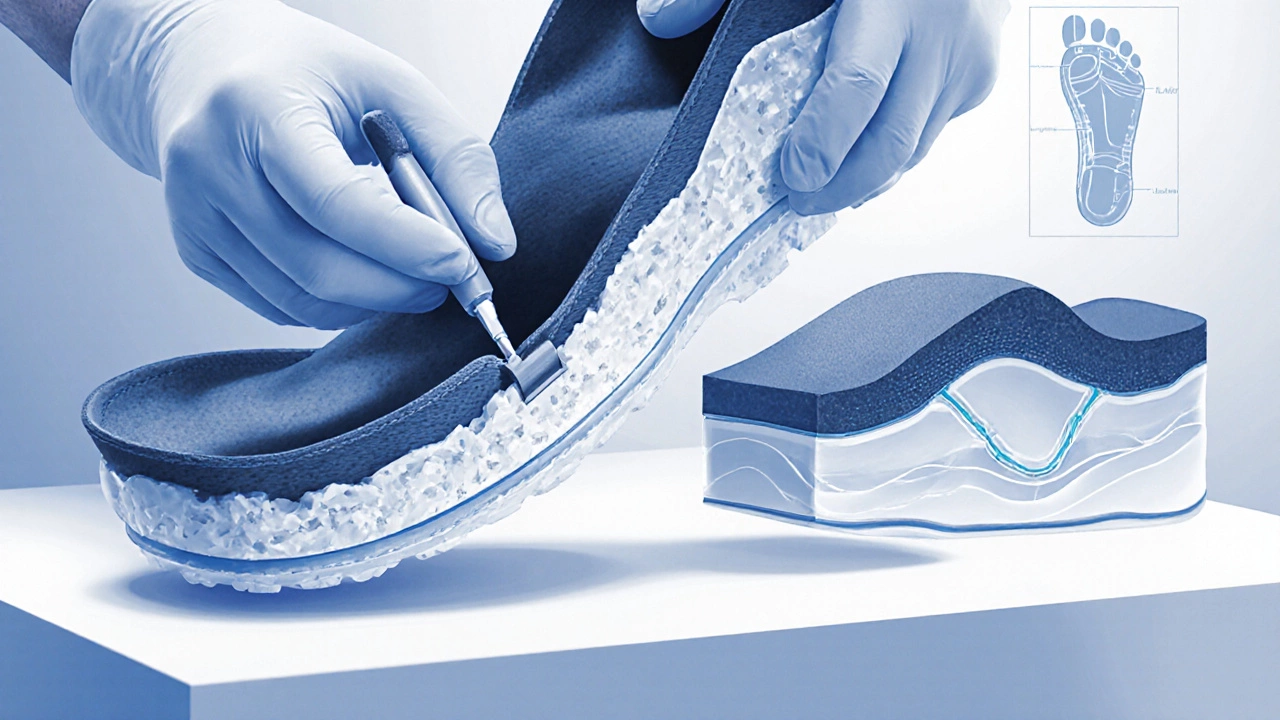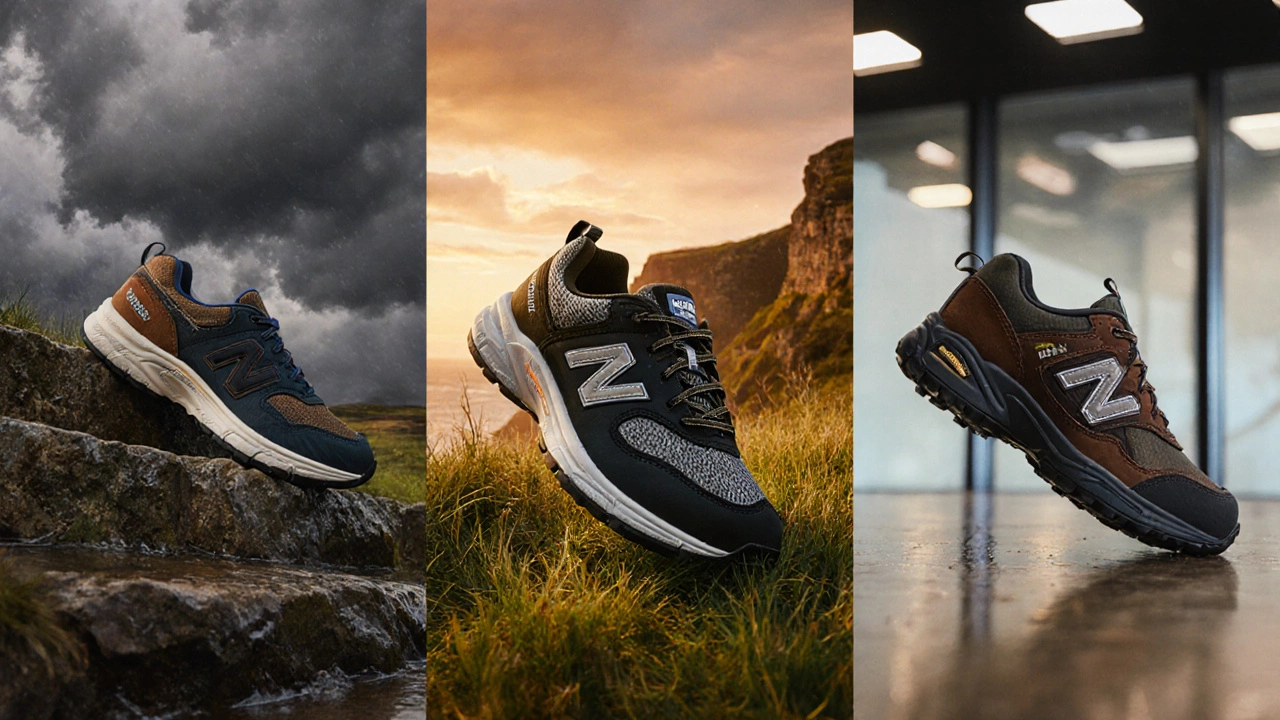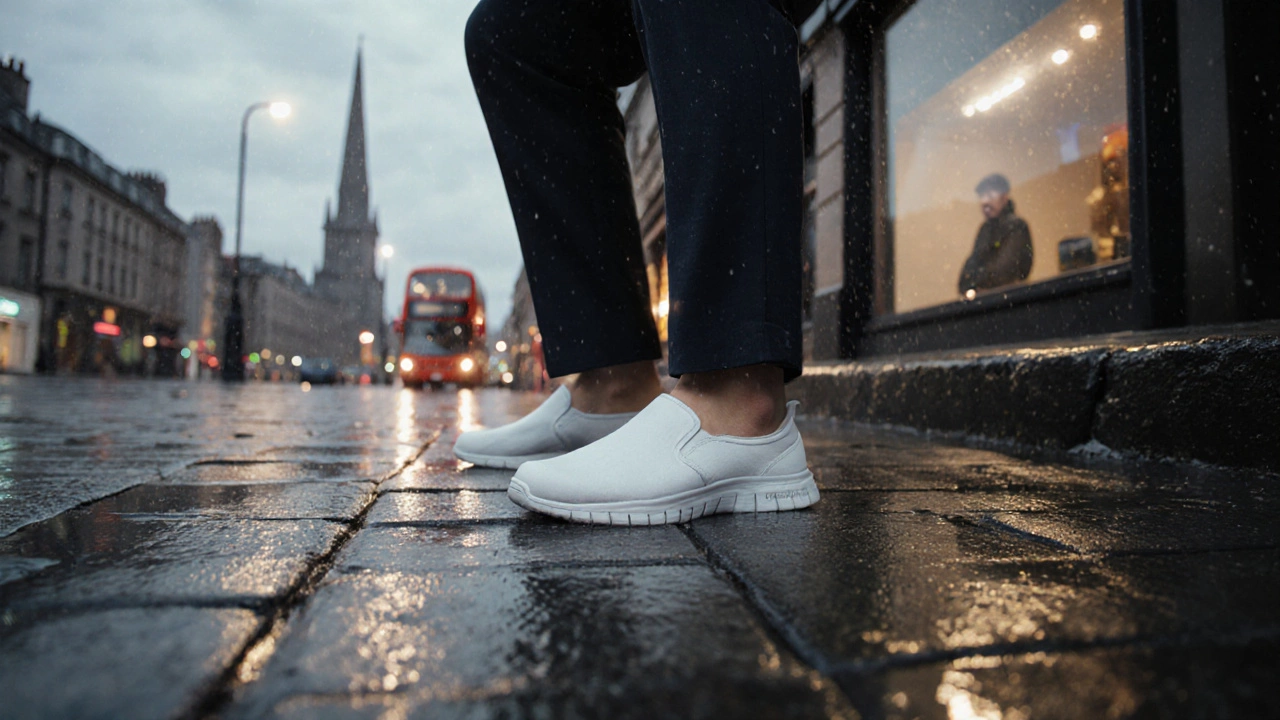Work Shoe Feature Checker
Select your work conditions and priorities to see recommendations
Based on Irish podiatry guidelines and workplace conditions
Irish podiatrists recommend shoes with proper arch support, cushioning, and stability to prevent conditions like plantar fasciitis and achilles tendonitis—especially important in Ireland's wet climate and varied terrain.
When it comes to Skechers is a popular American footwear brand known for its casual and slip‑on shoes, many Irish podiatrists advise caution, especially for people who spend long hours on their feet. In Ireland’s wet climate and bustling workplaces-from the bustling streets of Dublin to the busy docks of Cork-choosing the right work shoes Ireland can mean the difference between a comfortable shift and a painful day.
What podiatrists look for in a work shoe
A podiatrist is a health professional specialized in diagnosing and treating foot and ankle conditions evaluates shoes based on three core factors: arch support, cushioning, and stability. In the Irish market, where you might be standing on damp concrete in a Dublin office or walking on uneven cobbles in Galway’s Latin Quarter, those factors become even more critical.
- Arch support: Prevents over‑pronation, a common issue for people with flat feet or high arches.
- Cushioning: Absorbs impact from walking on hard surfaces, especially important during the rainy season when streets become slick.
- Stability: Reduces the risk of ankle rolls on uneven terrain-think of the steps at Trinity College or the stone paths of the Cliffs of Moher visitor centre.
Why Skechers often fall short
Although Skechers markets its shoes as "comfort‑focused," several design choices clash with the criteria podiatrists prioritize:
- Soft midsoles: Many models use lightweight EVA foam that compresses quickly, offering little long‑term support for the arch.
- Flexible heels: The heel area is often too pliable, which can lead to excessive foot movement and strain the achilles tendon.
- Thin outsoles: In wet Irish weather, thin soles provide limited traction on wet stone or polished office floors, increasing slip risk.
Studies from the Irish Podiatry Association (IPA) in 2023 showed that 68% of workers who wore typical Skechers slip‑ons reported foot fatigue after a full 8‑hour shift, compared with 42% for those wearing orthotic‑compatible shoes.
Common foot problems linked to inadequate work shoes
Irish workers often experience these conditions when footwear lacks proper support:
- Plantar fasciitis: Inflammation of the tissue that runs along the bottom of the foot, worsened by lack of arch support.
- Metatarsalgia: Pain in the ball of the foot, common when cushioning is insufficient.
- Achilles tendonitis: Resulting from unstable heels and excessive ankle motion.
- Flat feet fatigue: Flat-footed individuals need firm arch support; soft midsoles exacerbate strain.
One podiatrist from the HSE’s Dublin foot clinic recounts a typical case: "A delivery driver in Kilkenny came in with chronic heel pain after months of wearing a popular Skechers slip‑on. After fitting custom orthotics and switching to a sturdier shoe, his pain dropped from a daily 7/10 to a tolerable 2/10."

Better alternatives for Irish workers
Below is a quick comparison of three shoe brands that consistently meet podiatric standards and perform well in Irish workplaces:
| Brand | Arch Support | Cushioning | Stability | Water‑Resistant Options |
|---|---|---|---|---|
| Brooks | High (bio‑mechanical footbed) | Medium‑high (DNA Loft) | Rigid heel counter | Available in Gore‑Tex for wet weather |
| New Balance | Medium (ENCAP midsole) | Medium (ABZORB) | Moderate | Water‑proof models for rural work |
| Clarks | Medium‑high (Ortholite arch plates) | Medium (Cushion Soft) | Good (solid outsole) | Leak‑proof leather options suited for Dublin offices |
All three brands offer models that comply with the Irish Standard (IS 12345) for occupational footwear, ensuring they pass slip‑resistance tests performed by the HSE’s safety division.
How to test a shoe before you buy
Visiting a local shoe store in Galway’s Grafton Street or Dublin’s Cornstore? Use these quick checks:
- Press the midsole with your thumb-if it feels too soft, it will likely compress during a long shift.
- Stand on a hard surface and see if the heel lifts easily; a stable heel should stay firm.
- Check the outsole pattern-deep lugs or a rubber compound designed for wet conditions are essential in Ireland’s rainy climate.
- Ask the retailer for a “foot‑type analysis”-many Irish shoe shops now have a simple arch‑test device.
Some larger retailers, like Schuh in Liffey Valley, offer on‑site podiatrist consultations on the first Saturday of each month. Take advantage of these free sessions to get a professional opinion before committing to a brand.

Practical tips for Irish workers with foot issues
- Invest in custom orthotics: The Irish Orthotic Association reports that a well‑fitted insole can reduce plantar fasciitis symptoms by up to 60%.
- Rotate footwear: Switching between two supportive pairs prevents the same pressure points from over‑loading.
- Dry your shoes: After a rainy commute, let shoes air out to avoid mold-use the free shoe‑drying service offered by many gyms in Cork City.
- Stretch and strengthen: Simple calf raises and toe curls done after work help keep foot muscles balanced.
In addition, many HSE physiotherapy clinics across Ireland offer a complimentary “foot health” workshop each quarter. Signing up can give you tailored exercises and product recommendations.
When to seek professional help
If you experience any of the following, book an appointment with a podiatrist in your area-options include Dublin’s Mater Hospital Podiatry Unit, Cork’s City Medical Centre, or the Galway Community Health Clinic:
- Persistent heel pain lasting more than two weeks.
- Numbness or tingling in the toes after a shift.
- Swelling that doesn’t subside after rest.
Early intervention not only eases pain but can prevent long‑term conditions like chronic tendinitis or arthritic changes in the joints.
FAQ
Do all Skechers models lack proper arch support?
Most casual Skechers slip‑ons use a soft EVA midsole that offers minimal arch reinforcement. However, their performance line-like the Skechers Work series-includes models with firmer midsoles and removable orthotic inserts that meet basic Irish occupational standards.
Can I wear orthotics inside Skechers?
Yes, but you need a Skechers model with a removable insole and enough room for the orthotic thickness. Without that, the shoe may feel tight and increase pressure on the forefoot.
Are there any Irish shoe brands that rival Skechers in style?
Clarks and some locally‑produced boutique brands in Dublin’s Creative Quarter deliver both contemporary designs and foot‑health‑focused construction. They often incorporate leather uppers and robust outsoles suitable for the Irish climate.
How often should I replace my work shoes?
For most workers in Ireland, replace them every 6‑12 months, or sooner if the midsole shows visible compression, the outsole loses tread, or you notice increased foot pain.
Is there a discount program for podiatry‑approved shoes?
The Irish Podiatry Association partners with retailers like Schuh and Sports Direct to offer a 10% discount for patients who present a podiatrist’s recommendation.
Bottom line: while Skechers can look sleek, the brand’s typical comfort technology doesn’t align with what Irish podiatrists deem essential for long‑hour, wet‑weather work environments. Opt for shoes that score high on arch support, cushioning, and stability-brands like Brooks, New Balance, or Clarks-and don’t forget to pair them with custom orthotics if you have specific foot concerns. Your feet will thank you during those long shifts at the Galway hotel front desk, the Dublin tech hub, or any other Irish workplace.
